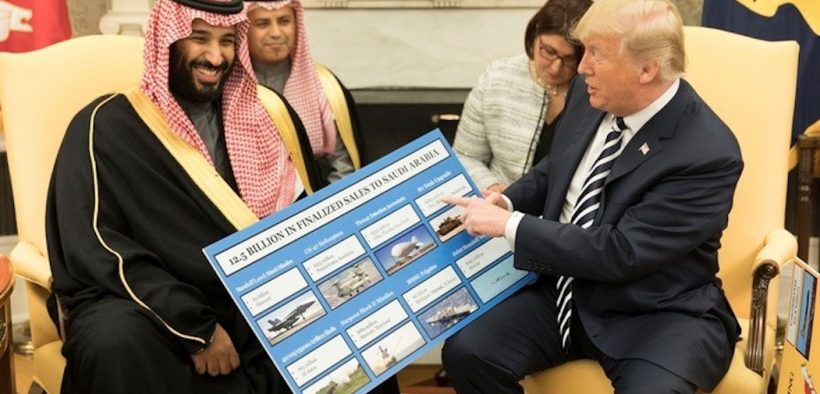House Votes To Halt Arms Sales To Saudi Arabia, Trump To Veto (Again)

“This is a strong message, I think, that our values must guide our foreign policy.”
On Wednesday, the U.S. House of Representative passed three resolutions to block President Donald Trump’s plan to sell precision-guided munitions to Saudi Arabia, Jordan, and the United Arab Emirates (UAE) without congressional review. The vote sends the bills to the White House, where Trump is likely to veto the resolutions.
“The evidence is clear: the Saudi government continues to disregard the vital distinction between combatants and innocent civilians in Yemen. Not only is the administration trying to the Saudis more powerful weapons, but we are giving them the opportunity to build their own,” Rep. Abigail Spanberger (D-Va.) told The Hill.
Two resolutions were passed after winning 238 votes, while the third with 237 votes. The resolutions were passed primarily by Democrats with each only gaining support from four Republican lawmakers.
The House vote came a month after the Senate passed 22 resolutions objecting to Trump’s plan to sell billions of dollars of weapons despite Congressional disapproval. While the House passed three of the 22 resolutions, the others are still to be voted on.
The three resolutions could cancel arms sales contracts related to American arms manufacturer Raytheon’s plan to build a joint factory in Saudi Arabia to assemble Paveway precision-guided bombs. In 2018, the use of that munition destroyed a school bus in Yemen that killed more than 40 children.
The passing of the resolutions shows Congress’ disapproval of U.S. military support for the oil-rich nation and frustration that Trump has sought to bypass Congressional approval for weapons sales. Last Monday, the House approved steps aimed at punishing Saudi officials involved in the murder of columnist Jamal Khashoggi.
In October 2018, Khashoggi, a Washington Post columnist and an outspoken critic of Saudi’s royal family, was killed and mutilated inside the Saudi consulate building in Istanbul, Turkey. His body has never been found, but a CIA report claimed that Saudi’s crown prince Mohamed bin Salman was behind the killing.
Trump Likely to Veto the Legislation
Last June, Congress voted to suspend arms sales to Saudi Arabia and the UAE following Trump’s decision to circumvent Congress by declaring “a state of emergency” to justify the arms sales worth $ 8.1 billion. Trump cited the need to counter Iran’s threat.
“These sales will support our allies, enhance Middle East stability, and help these nations to deter and defend themselves from the Islamic Republic of Iran,” Secretary of State Mike Pompeo told CNN at the time.
To override the president’s veto, a two-thirds majority in the House and Senate is required. According to Representative Eliot Engel, the Democratic chairman of the House Foreign Affairs Committee, such a move is necessary.
“This is a strong message, I think, that our values must guide our foreign policy,” Engel said, calling for more support ahead of the vote on Trump’s veto.
Investigative website Bellingcat found that 11 U.S states and Washington D.C have, so far, each sold arms worth more than $100 million to Saudi Arabia and the UAE since the beginning of the Saudi-led coalition in 2015.
“The administration is trying to abuse the law in order to sell weapons to supposed ally Saudi Arabia and the UAE. These are countries that are already using American-made weapons in a campaign in Yemen that resulted in innocent civilians being targeted and killed,” David Cicilline, a Rhode Island-based Democratic Congressman told Newsweek.
The weapons sales and a positive relationship with Saudi Arabia is a key component of the Trump administration as the Saudi kingdom is one of Washington’s leading partners in countering the alleged Iranian threat in the Middle East. U.S.-Iran ties have worsened since Trump abandoned the JCPOA last year, calling it an embarrassment.
On Tuesday, the Senate Foreign Relations Committee is expected to vote on two Saudi-related drafts. One is a bill supporting sanctions to back a peaceful resolution to the Yemen war, address Yemen’s humanitarian crisis and charge those responsible for killing Khashoggi.
The other would focus on a thorough review of Washington’s policy on Saudi Arabia and ban travel to the U.S. by the Saudi royal family’s members.














Birds of a feather….